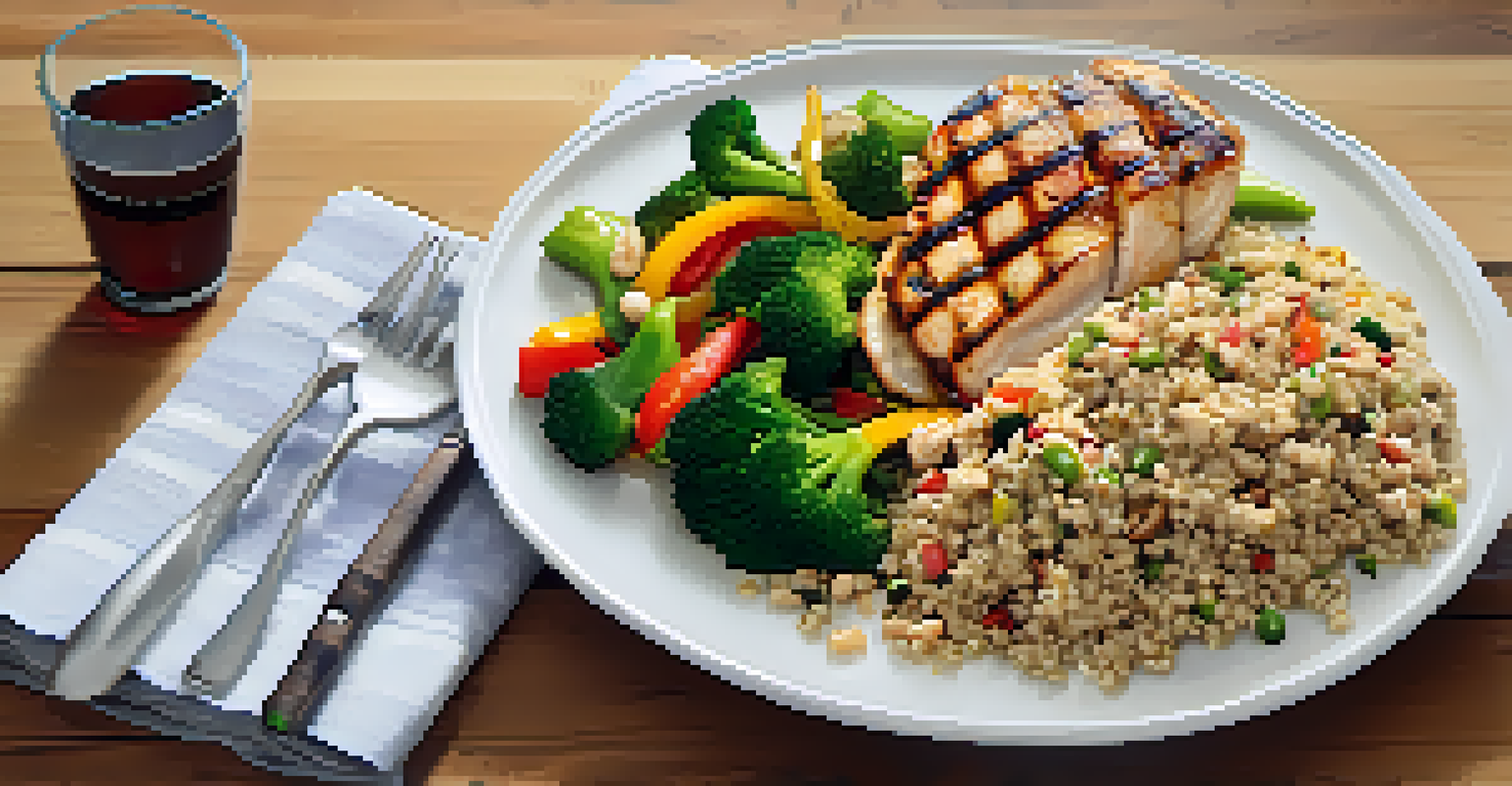Understanding Protein Needs: Powerlifting Nutrition Myths

The Importance of Protein in Powerlifting Nutrition
Protein plays a crucial role in powerlifting, as it helps repair and build muscle after intense workouts. When you lift heavy, your muscle fibers undergo stress and need adequate nutrients to recover efficiently. Think of protein as the building blocks that help your muscles repair themselves stronger and more resilient.
Protein is critical to a powerlifter’s diet, but it's the balance of all nutrients that truly fuels performance.
Many powerlifters believe that more protein automatically translates to better performance, but that's not necessarily true. While protein is essential, the overall balance of your diet—including carbohydrates and fats—is equally important. Without the right mix, you might miss out on the energy needed for those heavy lifts.
Ultimately, understanding your unique protein needs can enhance your performance and recovery. It’s not just about consuming large quantities; it’s about timing, quality, and ensuring that your overall nutrition supports your training goals.
Common Myths About Protein Intake for Powerlifters
One of the biggest myths in the powerlifting community is that you need to consume an excessive amount of protein to see any gains. Some athletes believe that consuming two grams of protein per kilogram of body weight is necessary, but research suggests that for most lifters, around 1.6 to 2.2 grams is sufficient. This means that moderation is key, rather than going overboard.

Another myth is that protein supplements are the only way to meet your protein needs. While protein shakes can be convenient, whole food sources like chicken, fish, eggs, and legumes are often more beneficial. They provide additional nutrients that supplements may lack, supporting your overall health and performance.
Protein Is Essential for Recovery
Consuming adequate protein helps repair and build muscle after intense workouts, contributing to better performance.
It’s also a misconception that all protein sources are created equal. For example, plant-based proteins may require combining different sources to achieve a complete amino acid profile. Understanding the quality of the protein you consume is essential for maximizing your gains.
How Much Protein Do Powerlifters Really Need?
The amount of protein you need can vary based on several factors, including your weight, training intensity, and overall goals. Generally, aiming for about 1.6 to 2.2 grams of protein per kilogram of body weight is a solid guideline for powerlifters. This range helps ensure adequate recovery and muscle growth without excessive intake.
The best source of protein is the one that fits your lifestyle and supports your training goals.
For those in the off-season or looking to maintain weight, the lower end of that spectrum might suffice. However, if you’re in a cutting phase or aiming to build muscle mass, leaning towards the higher end could provide the extra support you need. Individual responses can vary, so it's essential to listen to your body and adjust accordingly.
Tracking your protein intake and assessing how your body responds can help you find the sweet spot for your needs. It’s not just about hitting a number; it’s about understanding how you feel and perform with varying levels of protein consumption.
Timing: When Should You Consume Protein?
Timing your protein intake can significantly impact your recovery and muscle-building efforts. Consuming protein within 30 minutes to two hours after your workout can help maximize muscle repair and growth. This is often referred to as the 'anabolic window,' where your body is primed to absorb nutrients.
Incorporating protein-rich meals or snacks throughout your day also plays a crucial role. Instead of waiting until the end of the day to meet your protein goals, spreading your intake across meals can enhance muscle protein synthesis. Think of it as fueling your body regularly, much like refueling a car during a long road trip.
Quality Over Quantity Matters
Not all protein sources are equal; focusing on high-quality options can enhance overall health and muscle gains.
Ultimately, finding a protein timing strategy that works for you can enhance your overall nutrition plan. Experimenting with different approaches allows you to discover what helps you feel and perform your best.
Protein Quality: Choosing the Right Sources
Not all proteins are created equal, and understanding the differences can help you make informed choices. Complete proteins, which contain all essential amino acids, are found in animal sources like meat, fish, and dairy. Plant-based sources, like beans and lentils, can be great but often require combining to ensure you're getting a full profile.
Incorporating a variety of protein sources into your diet can provide additional nutrients and benefits. For example, fatty fish not only offer protein but also healthy omega-3 fatty acids that can reduce inflammation. This can be particularly beneficial for powerlifters who frequently put their bodies under strain.
Being mindful of protein quality can enhance your overall health and performance. A well-rounded diet rich in diverse protein sources supports not just your lifting goals but your overall well-being.
Balancing Protein with Other Nutrients
While protein is vital, it shouldn't overshadow the importance of carbohydrates and fats in your diet. Carbs are the primary source of energy for your workouts, and without them, you may feel sluggish during your lifts. Integrating complex carbohydrates—like whole grains, fruits, and vegetables—can provide sustained energy for those heavy training sessions.
Fats also play a crucial role in hormone production and overall health. Healthy fats, found in avocados, nuts, and olive oil, support various bodily functions that can impact your performance. Balancing your macronutrients is essential to ensure you're not only recovering well but also fueling your workouts effectively.
Balance Your Nutrients Wisely
Incorporating carbohydrates and fats alongside protein is crucial for sustaining energy and optimizing performance.
Ultimately, achieving a well-rounded diet that includes protein, carbs, and fats will support your training goals. It’s about creating a harmonious relationship between all these nutrients to optimize your performance.
Listening to Your Body: Individual Needs Matter
Every powerlifter is unique, and your protein needs can differ based on various factors like age, gender, and training intensity. Listening to your body is crucial; if you feel fatigued or are not recovering well, it might be time to reassess your nutrition. Experimenting with your protein intake can help you find what works best for you.
Additionally, consulting with a sports nutritionist can provide personalized insights tailored to your specific situation. They can help you create a nutrition plan that aligns with your training goals and lifestyle. Having expert guidance can take the guesswork out of your nutrition and optimize your results.

Remember, there’s no one-size-fits-all approach in powerlifting nutrition. Embrace the journey of discovering what fuels your body best and supports your lifting goals.